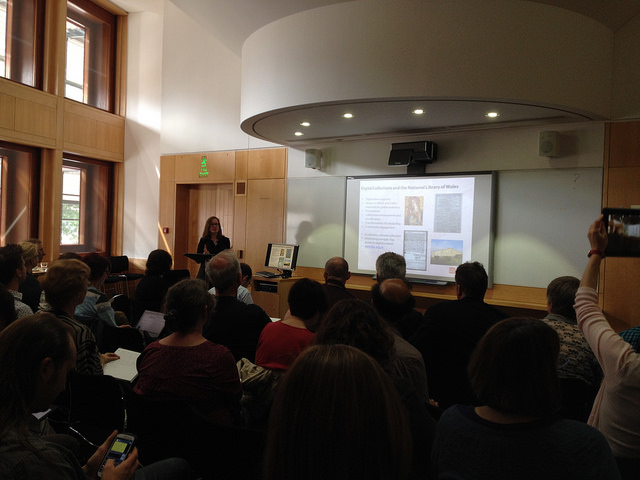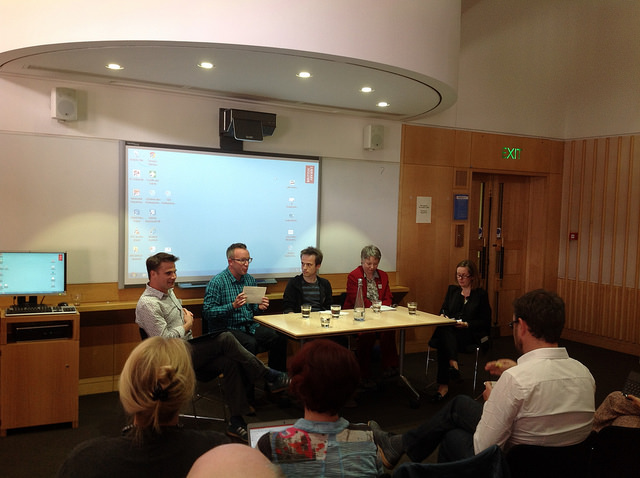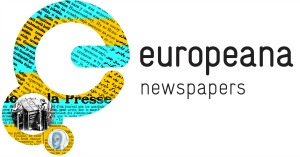On 9 June the British Library, a project partner, hosted the Europeana Newspapers UK Information Day. The event raised awareness of the project among newspaper researchers, one of the key user communities for Europeana Newspapers.

Audience
47 participants attended the day, the majority of whom were academic researchers from different disciplines: history, English, social science, media and digital humanities. The audience included also representatives from UK national, research and public libraries, online publishers and funders. The other two UK-based partners, The PRImA Research Lab at The University of Salford and The National Library of Wales, also attended the event and contributed to the programme. The participation of all these groups led to a very productive dialogue during the day, especially during the final panel discussion. The event programme was varied and comprised eight presentations.
National digitised historic newspapers collections
Dr Luke McKernan introduced the UK national collection of newspapers held at the British Library and the Library’s provision of news service in its newly opened Newsroom. Currently over 8 million digitised pages are accessible in the British Newspaper Archive (BNA) created through the Library’s Public Private Partnership with DC Thomson Family History. This is 2% of the physical collection held by the Library.
Ed King, former Newspapers Curator at the British Library, illustrated the breadth and depth of subjects covered in the digitised newspapers in the BNA: from the expected news reports and editorials to the less expected celebrity gossip, science and music news. Researchers want to see more local/regional titles and shorter runs digitised; in other words, the ones that did not make it.
Professor Lorna Hughes presented the Welsh Newspapers Online portal which gives access to 6.8 million newspaper articles in English and Welsh. The National Library of Wales is building a cohesive national collection that is freely accessible to all in order to realise the potential social, research and economic benefits of the resources.

Showcasing research on digitised newspapers
Digitised newspapers open new opportunities for scholars who combine a subject interest with digital methods of research. Two academics working in the field of digital humanities, presented on their research interests in digitised newspapers. Dr Paul Gooding revealed some of the findings from his doctoral study of the impact on users of large scale newspaper digitisation and highlighted the value of digitised newspapers as sources of contemporary information for user behaviour studies.
Dr Ulrich Tiedau a historian and digital humanist introduced the new international Assymetrical Encounters Assymetrical Encounters project that will apply text-mining techniques to multilingual and transnational digitised corpora, including newspapers, to answer questions about reference cultures in Europe.

Europeana Newspapers Project
The project partners and deliverables were introduced by Dr. Rossitza Atanassova. Alastair Dunning’s presentation on the design of the prototype ’browser’ and the usability testing feedback provoked an audience discussion on the quality of OCR, the value of crowdsourcing, the limitations/bias of online newspaper archives. Stefan Pletschacher impressed the audience with his presentation on the evaluation and quality assessment workflows and tools developed by the PRImA Lab.

The day ended with an engaging panel and audience discussion on the value digitised historic newspapers have for researchers and other user groups. Participants welcomed the creation of a cross-searchable European historic newspapers archive. However, they felt that the multilingual content could be a barrier for the public and that this could be helped by embedding a translation software on the interface. A problem for researchers is that only a small proportion of the historic newspapers are available online and thus the focus of their research is quite narrow. Researchers want to see more newspapers digitised with OCR available for all titles.
An important message of the day was that content providing institutions need to understand better the research value of the digitised newspaper collections to justify future digitisation and secure funding.

Participants engaged in wide social media coverage throughout the day, sharing positive comments, photographs and highlights from the presentations on Twitter. There were about 50 Tweets using the #UKInfoday hashtag. Photos of the day are available on Flickr, presentation slides on slideshare. See also the excellent Storify account of the day compiled by Luke McKernan.
